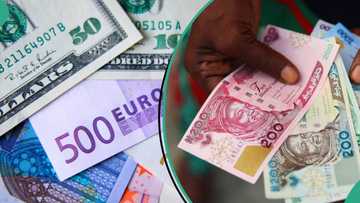CBN Names Two Factors That Drive Supply of Dollar as Naira Crashes Again
- CBN data showed that Nigerians spend dollar mainly on overseas medical and education
- The amount allocated for the two services rose from $1.76 billion in 2021 to $1.81 billion in 2022
- However, the naira has continued to decline again after strengthening for some days due to CBN’s intervention
Legit.ng journalist Zainab Iwayemi has over three years of experience covering the Economy, Technology, and Capital Market.
In the nine months from January to September 2023, the Central Bank of Nigeria's dollar supply for overseas medical and educational costs increased by 49.22% to $1.81 billion.
According to CBN data, Nigeria spent somewhat more on international education and health-related concerns abroad in 2023—$1.81 billion compared to $1.76 billion spent at the same time in 2022.

Source: UGC
The amount allocated for these two charges was insignificant compared to the $2.49 billion available during the same period in 2021.

Read also
Standard Bank predicts new exchange rate for naira, sets FX inflow at $5.1 billion in 3 months
PAY ATTENTION: Click “See First” under the “Following” tab to see Legit.ng News on your Facebook News Feed!
The top bank defined the balance of payments as a systematic record of economic and financial transactions between residents and non-residents of an economy for a specific period in an explanatory note titled Note D.
Nigerians are renowned for travelling abroad for proper health care due to poor health infrastructure their country.
The desire for international education among Nigerians has also grown despite declining dollar reserves due to a failing educational system and economic crisis.
Nigeria has received fewer dollars in recent years due to decreased foreign investments, a shortfall of crude oil, and a dip in remittances from the diaspora.
Despite the decline in the supply of dollars, Olayemi Cardoso, governor of the Central Bank of Nigeria (CBN), recently observed that two major factors contributing to the nation's demand for foreign cash are medical tourism and the increasing number of Nigerians studying abroad.
In a speech to the House of Representatives, Cardoso revealed that, in the ten years between 2010 and 2020, Nigerians spent more than $40 billion on healthcare and education abroad, BusinessDay reported.
He stated:
"It's important to note the growing number of Nigerian students studying abroad when examining the demand side of the exchange rate."
According to a 2023 report by the Washington-based Institute of International Education, there were 17,640 Nigerian students enrolled at US colleges and institutions in the 2022–2023 academic year, up from 14,438 the year before. This represents a 22.2% increase.
According to an examination of the report, more Nigerians were living in the US in 2022 than in 2022. According to the institute's analysis, Nigeria was the only African nation among the top 10, with the most significant proportion of students studying in the United States.
According to specialists, inadequate medical equipment and a lack of trust in medical facilities are the leading causes of medical travel.
Meanwhile, FMDQ data showed that the Naira recorded another drop to N1308.52 per Dollar on Wednesday compared to N1,300.15 exchanged on Tuesday.
On a day-to-day basis, this represents an N8.37 drop from N1,300.15 per Dollar it traded on Tuesday.
Nigeria’s external reserve falls by $2.16 billion
Legit.ng earlier reported that the CBN data disclosed that Nigeria's external reserves decreased by $2.16 billion during the previous month, reaching a seven-year low of $32.29 billion on April 15, 2024, from $34.45 billion on March 18, 2024.
Recall that a recent Bloomberg report estimated that Nigeria may be using up its foreign exchange reserves at a rate not seen in four years.
The development raised questions about whether the central bank is reducing its dollars to sustain the naira despite having previously promised to allow the currency to float more freely.
PAY ATTENTION: Unlock the best of Legit.ng on Pinterest! Subscribe now and get your daily inspiration!
Source: Legit.ng



